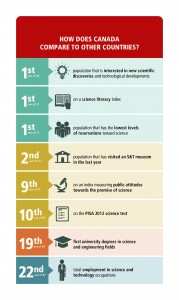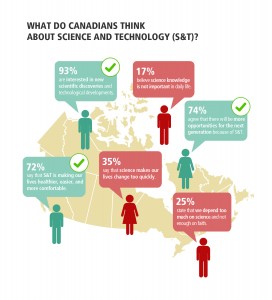 A recent survey carried out by the Council of Canadian Academies, found that most Canadians value science (see results infographics at left & right), yet funding to higher education research is a drop in the bucket of Ontario's and Canada's overall budgets. The report by the Expert Panel on the State of Canada’s Science Culture: SCIENCE CULTURE: WHERE CANADA STANDS should be mandatory reading for everyone learning, teaching or researching in STEM.
A recent survey carried out by the Council of Canadian Academies, found that most Canadians value science (see results infographics at left & right), yet funding to higher education research is a drop in the bucket of Ontario's and Canada's overall budgets. The report by the Expert Panel on the State of Canada’s Science Culture: SCIENCE CULTURE: WHERE CANADA STANDS should be mandatory reading for everyone learning, teaching or researching in STEM.
Most Americans (we don't know how many Canadians) can't name a living scientist. Note to my students: I AM a living scientist, though you may sometimes think that I am a vampire or zombie. Scientists and university professors (overlapping groups) ideally need the public to vote for governments with policies that support us.
 One way to build this support is to communicate what we do to the public(s). Yet many science students and professors are poor communicators. I don't simply mean that they can't explain scientific concepts in a straightforward, accessible and fun way. I also mean that they don't get back to each other in a timely fashion and continually leave communications loops unclosed so that people who would help and support them, don't know what's going on.
One way to build this support is to communicate what we do to the public(s). Yet many science students and professors are poor communicators. I don't simply mean that they can't explain scientific concepts in a straightforward, accessible and fun way. I also mean that they don't get back to each other in a timely fashion and continually leave communications loops unclosed so that people who would help and support them, don't know what's going on.
Not only do my undergraduate students often fail to follow up on key emails, when people are doing them a favour that will help them advance their research, but I frequently send emails out to colleagues, that never get a reply. I have hundreds of emails of the latter sort. (I'm also guilty of not having gotten back to various people, but not as bad as many of my fellow York University professors).
I have found email to be a total and utter time sink since around 2000. For the first 12 years (I started on email around 1988), it was ok; there wasn't very much of it. I don't actually send out that many emails and I don't bother deleting them. I just buy more space to accommodate my inbox, and use the search function. Disk space is cheap and plentiful, while my time is not. Recently, I came across a blog post with two google executives' advice on how to manage email. I agree with it.
Mostly, keep it short MT @Andrew_Griffith: Google Exec Eric Schmidt's 9 #Email rules http://t.co/7n8poCiMOX HT @feedly Worth doing.
— Dawn Bazely (@dawnbazely) September 25, 2014
So, being a good communicator, is about responding to your emails as well as getting back to people promptly. Lots of students are very slow at getting back to me, but get all jumpy if I don't get back to them in 12 hours. Seriously! There are some very funny posts about student emails out there.
Being a good communicator takes constant practice at speaking and writing. Blogging is a good way to practice writing. So is tweeting. Actually, writing is a good way to practice writing, and not many students write much these days. There is lots of excellent advice out there on how to blog effectively, like this Science blogging tips post by communications students, over at Scilogs.com. There's also lots of discussion and debate about what scientists (and that includes undergraduate students, who are learning to do science) are doing with twitter and what they can learn from engaging with social media.
Re-reading @HopeJahren, I'd add #TiltingAtWindmills to her list of #TwitterGains:To Colleagues Re:Twitter http://t.co/1jINASRgBu #ComicSans
— Dawn Bazely (@dawnbazely) September 25, 2014
Dawn Bazely

